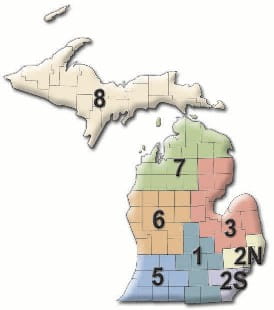The web Browser you are currently using is unsupported, and some features of this site may not work as intended. Please update to a modern browser such as Chrome, Firefox or Edge to experience all features Michigan.gov has to offer.
Dialysis Disaster Planning Resources
COVID-19 Information
Developing Emergency Plans for your Facility
-
CMS Emergency Preparedness for Dialysis Facilities: A Guide for Chronic Dialysis Facilities
-
National Kidney Foundation Planning for Emergencies: A guide for People with Chronic Kidney Disease
-
CMS-Quality, Safety & Oversight - Certification & Compliance
Regional and Local Contact Information
To the right, you will find a map of the 8 regional healthcare coalitions. Identify in which county your facility resides to determine your designated region.
-
Region 1: Clinton, Eaton, Gratiot, Hillsdale, Ingham, Jackson, Lenawee, Livingston, and Shiawassee Counties
-
Region 2N: Oakland, Macomb, and St. Clair Counties
-
Region 2S: City of Detroit; Monroe, Washtenaw, and Wayne Counties
-
Region 3: Saginaw, Alcona, Iosco, Ogemaw, Arenac, Gladwin, Midland, Bay, Genessee, Tuscola, Lapeer, Sanilac, and Huron Counties
-
Region 5: Allegan, Barry, Calhoun, Branch, St. Joseph, Cass, Berrien, Van Buren, and Kalamazoo Counties
-
Region 6: Clare, Ionia, Isabella, Kent, Lake, Mason, Mecosta, Montcalm, Muskegon, Newaygo, Oceana, Osceola, and Ottawa Counties
-
Region 7: Manistee, Wexford, Missaukee, Roscommon, Benzie, Leelanau, Grand Traverse, Kalkaska, Crawford, Oscoda, Antrim, Otsego, Montmorency, Alpena, Presque Ilse, Cheboygan, Emmet, and Charlevoix Counties
-
Region 8: Chippewa, Mackinac, Luce, Schoolcraft, Delta, Alger, Marquette, Dickinson, Menominee, Baraga, Iron, Gogebic, Ontonagon, Houghton, and Keweenaw Counties
Each regional healthcare coalition has a Regional Coordinator that manages the ASPR cooperative agreement for healthcare preparedness activities. Each county has a local Emergency Manager who is responsible for assessing and measuring a local jurisdiction's capability to mitigate against, prepare for, respond to, and recover from emergency and disaster events. At each of the local public health departments, there is a full-time Emergency Preparedness Coordinator who manages the CDC cooperative agreement activities for their jurisdiction.